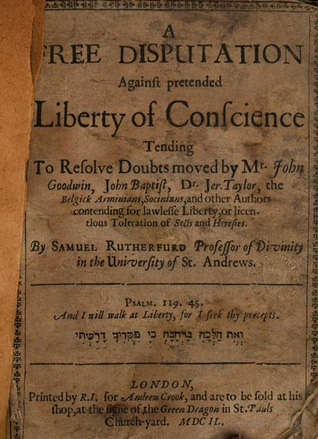- Bible
- Read the Bible
- Bible Versions
- Verse of the Day
- Reading Plans
- Verses by Topic
- Books of the Bible
- Bible Images
- Study
- Commentaries
- Concordances
- Dictionaries
- Encyclopedias
- Sermons
- Bible Atlas & Maps
- BP Wiki
- Devotionals
- Today's Devotionals
- Light of the World
- All Devotionals
- Inspirational Quotes
- More
- Picture Quotes
- Videos
- Inspirational
- Bible Study
- What The Bible Says
- Bible Q&As
- Daily Bread
- Bible by Genre
- Bible Stories
- Random Bible Verse
- Community
- Store
Conscience, Liberty and God's Word: A Free Disputation Against Pretended Liberty of Conscience
by Samuel Rutherford
The name of Samuel Rutherford has been commonly associated with the literary upheaval of seismic proportions that was brought by his book, Lex Rex, or The Law and the Prince (1644), against the arbitrary rule of kings claiming a Divine right from God to exercise absolute power (tyranny) over a nation (in both church and state). Conscience, Liberty and God's Word (previously known as A Free Disputation Against Pretended Liberty of Conscience) takes aim at another gross error of treason against God and the supreme authority he exercises over the moral person of church, state, and the individual person. Now Rutherford (arguably the brightest star in the constellation of Scottish commissioners sent to the Westminster Assembly) exposes both the treason against God endemic in asserting the freedom of conscience to worship God in whatever way a person believes is right (regardless of what God actually states in his Word), and the tyranny that consequently results against our neighbor when the individual conscience has no higher Divine Law to which it must submit. The consequences for the Christian are enormous in how one views the conscience in relationship to God's Law, and how he will consequently behave in both Church and State. This is the classic Reformed, Protestant treatment of the biblical role the conscience plays in the church, in the state, and in the individual.
BUY NOW
Paperback, 487 pages
Published by Gospel Covenant Pubilications
© 2025 Bibleportal.com All rights reserved.

Rutherford was also known for his spiritual and devotional works, such as Christ Dying and drawing Sinners to Himself and his Letters. Concerning his Letters, Charles Spurgeon wrote: "When we are dead and gone let the world know that Spurgeon held Rutherford's Letters to be the nearest thing to inspiration which can be found in all the writings of mere men". Published versions of the Letters contain 365 letters and fit well with reading one per day.
Rutherford was a strong supporter of the divine right of Presbytery, the principle that the Bible calls for Presbyterian church government. Among his polemical works are Due Right of Presbyteries (1644), Lex, Rex (1644), and Free Disputation against Pretended Liberty of Conscience.
Samuel Rutherford was a Scottish Presbyterian theologian and author. He was one of the Scottish Commissioners to the Westminster Assembly.
Born in the village of Nisbet, Roxburghshire, Rutherford was educated at Edinburgh University, where he became in 1623 Regent of Humanity (Professor of Latin). In 1627 he was settled as minister of Anwoth in Galloway, from where he was banished to Aberdeen for nonconformity. His patron in Galloway was John Gordon, 1st Viscount of Kenmure. On the re-establishment of Presbytery in 1638 he was made Professor of Divinity at St. Andrews, and in 1651 Rector of St. Mary's College there. At the Restoration he was deprived of all his offices.
Rutherford's political book Lex, Rex (meaning "the law [and] the king" or "the law [is] king") presented a theory of limited government and constitutionalism. It was an explicit refutation of the doctrine of "Rex Lex" or "the king is the law." Rutherford was also known for his spiritual and devotional works, such as Christ Dying and drawing Sinners to Himself and his Letters.
... Show more